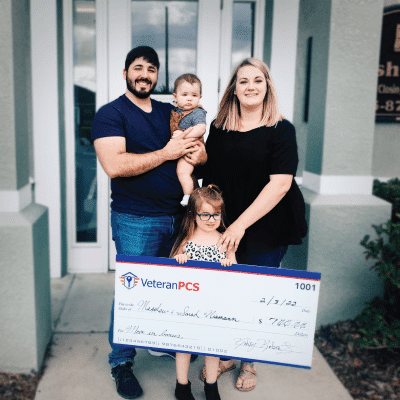For military families, navigating a Permanent Change of Station (PCS) move can be a complex process, made even more challenging when children are involved. Understanding and addressing your children’s needs during this significant change is crucial for their well-being and adjustment. This blog post aims to offer supportive advice and resources for active duty military families managing a PCS move with children, focusing on age-appropriate communication, adjustment strategies, and maintaining normalcy throughout the transition.
Adapting to new environments, schools, and social circles can be daunting for children. By employing thoughtful approaches and tapping into available resources, families can ease the adjustment process, helping children embrace the changes with resilience and optimism. Let’s explore effective strategies for supporting your children through a PCS move.
Age-Appropriate Strategies for Discussing the Move
Toddlers and Preschoolers
- Simple Explanations: Use simple, positive language to explain the move. Picture books about moving can help make the concept more relatable.
- Reassurance: Offer extra comfort and reassurance. Maintaining a regular routine as much as possible can provide stability.
School-Aged Children
- Open Conversations: Encourage open discussions about the move. Allow children to express their feelings and concerns, and address them with understanding and reassurance.
- Involvement: Involve them in the moving process, such as packing their room or planning the layout of their new space, to give them a sense of control.
Teenagers
- Acknowledgement: Recognize and validate their feelings about leaving friends and familiar settings. Discuss the opportunities the new location presents.
- Social Continuity: Help them find ways to stay in touch with old friends while exploring new social opportunities.
Tips for Helping Children Adjust to a New Environment
- Schools: Research schools in your new location early. Engage with teachers and staff to ensure a smooth transition. Visit the school with your child before their first day, if possible.
- Friends and Activities: Encourage involvement in activities, sports, or clubs to help your child form new friendships. Community centers and youth groups can also offer social opportunities.
Familiar Routines: Try to re-establish familiar routines in your new home as soon as possible. Consistent meal times, bedtime routines, and family activities can provide comfort and stability.
Buying or Selling?
Connect with VA Loan Expert
Resources for Military Families During PCS
- Military Child Development Centers: Offer quality childcare and early education. MilitaryChildCare.com provides a centralized location for military families to find and request care.
- Relocation Assistance Programs: Available through your installation’s Military and Family Support Center, these programs offer workshops, counseling, and information to help families adjust to their new environment.
- School Liaison Officers: Can assist with school transfers and ensuring educational continuity for your children. They serve as a bridge between military families and schools.
Maintaining Normalcy and Routine
- Involve Children in Setting Up Their Space: Allowing children to arrange and decorate their room can help them feel settled and in control.
- Regular Family Time: Maintain regular family activities, such as game nights or weekend outings, to reinforce family bonds and provide a sense of continuity.
- Stay Positive: Your attitude towards the move can significantly influence your children’s outlook. Focus on the positive aspects and opportunities the new location offers.
Conclusion
A PCS move can be a time of significant change for military families, particularly for children. By employing age-appropriate strategies for communication, supporting their adjustment to new environments, and leveraging available resources, families can navigate these transitions more smoothly. Remember, each child is unique, and patience, understanding, and flexibility are key to helping them adapt to their new surroundings. With the right support and preparation, your family can turn the challenges of a PCS move into opportunities for growth and new experiences.
Buying or Selling?
Connect with VA Loan Expert
FAQ
What should military families consider when researching schools and educational facilities?
Researching schools and educational facilities is crucial for military families planning a PCS overseas. Consider factors such as curriculum offerings, language programs, special education services, extracurricular activities, and the availability of educational support for military-connected students. It’s also essential to understand the enrollment process, admission requirements, and any necessary documentation for school registration in the new location.
How can military families manage the financial aspects of a PCS overseas move?
Managing the financial aspects of a PCS overseas move requires careful budgeting and utilizing available resources. Assess your expenses, create a detailed budget, and explore military-specific financial assistance programs, such as the Overseas Cost of Living Allowance (COLA) and the Dislocation Allowance (DLA). Additionally, familiarize yourself with the exchange rate, banking options, and potential tax implications in your new location to effectively manage your finances during the transition.
How can military families support children and family members emotionally during a PCS overseas?
Supporting family members, especially children, emotionally during a PCS overseas is essential. Communication is key – encourage open discussions about feelings, concerns, and expectations regarding the move. Take advantage of military support programs, such as counseling services or support groups, to provide additional emotional support. Helping family members stay connected with their friends and established routines can also aid in easing the emotional impact of the move.
What steps should military families take to integrate into their new community?
To integrate into the new community, military families can engage in various activities. Attend orientation sessions provided by the military installation, join local community groups or clubs, and participate in events or volunteer opportunities. Connecting with other military families and reaching out to local residents can help foster a sense of belonging. Embracing the local culture, traditions, and exploring the new environment can also contribute to a smoother integration process.
Questions about Military Transition help?
Navigating Your PCS Move with Pets: A Comprehensive Guide
For military families, pets are cherished...
The Ultimate PCS Binder Guide: Get Organized for Your Move
Imagine you've just settled into the rhythm of...
PCSing to Another State: How VeteranPCS Eases the Transition with Veteran Real Estate Experts
Introduction Permanent Change of Station (PCS)...











